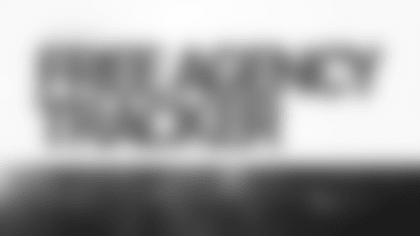Join jaguars.com senior editor Vic Ketchman as he tackles the fans' tough questions.
Galen from Merritt Island, FL:
I have to admit I like reading your column almost daily. I am hoping you might like to take a guess on the outcome (wins vs. losses) of the Jaguars this year. Being of an older age with everything getting shorter including my memory, you might have already answered this and I have forgotten it.
Vic: What I have said is that my expectation for the Jaguars this season is that they compete for the division title. I don't get much into records because that's too specific, but history would suggest it'll take at least 10 wins to win the AFC South.
Ron from Peoria, AZ:
What are the restrictions on a player being placed on the practice squad? Can they be activated during the season and returned to the practice squad?
Vic: Yes, a player may be moved from the practice squad to the active roster and back to the practice squad. To understand who qualifies to be placed on the practice squad, it may be easier to understand who doesn't qualify. If a player appeared on a team's 45-man roster for nine or more regular-season games in one season, he is no longer eligible for the practice squad. All other players are eligible for the practice squad but may only spend two years on the practice squad; any combination of regular season games, postseason games or bye weeks on the practice squad that total three in one year constitutes a year on the practice squad. For example, if a player was on the practice squad for three games last season, he has one year of practice squad eligibility remaining. If he was on the practice squad for only two games last season, he still has two years of eligibility remaining. A practice-squad player is a free agent able to sign with any team in the league, but must be placed on the active roster of any team signing him. A practice squad player, however, can not sign with his team's next opponent six days or fewer prior to the game. He can sign on Monday for a Sunday game, but not on Tuesday or after. There are some people who call that the Coughlin rule.
Tim from Atlanta, GA:
I saw in your column that Steve from Jacksonville asked about the convention registration form. I could not find it on the jaguars.com site. Please direct me to where it is hidden and confirm if convention registration has begun. I have not seen anything in your "Ask Vic" column about the registration and where to sign up. Please don't leave us out.
Vic: Registration began this week. You may access the registration form by clicking on the "Ask Vic Convention Registration" box inside the "poll" and adjacent to the "Ask Vic" box on the home page. We won't leave you out.
Dave from Saint Marys, GA:
Did I miss something or did you post the prices for the "Ask Vic" convention and I just didn't see it? I read the site daily. I don't know how this happened.
Vic: We haven't done a good job of displaying the registration link prominently. For the first four days, access of the registration form appeared as a one-line link underneath the top story on the home page. Yesterday, we made it a little more prominent and assigned it a new place (see above answer for location). The prices are: golf, $40; reception, $30; tailgate party, $30; game ticket, $20; hotel room, $75. Golf includes 18 holes at South Hampton Golf Club. We'll give each golfer a goodie bag and post-golf prizes will be awarded at the reception. We're working on some special prizes. The "Ask Vic" fan reception will be held in the Bud Zone in Alltel Stadium, and we'll get some headliners to make appearances. The reception isn't just for the golfers; it's for all "Ask Vic" fans who want a night out. The tailgate party will be held in the new cabana area outside Alltel Stadium. The reception and tailgate party prices include all-you-can-eat food and refreshments (soft drinks, beer and wine). The game ticket will be a good value. If you need a hotel room, we'll make a reservation for you at the Adam's Mark in downtown Jacksonville. It's a very plush hotel – uptown all the way – and it's located adjacent to the river walk and Jacksonville Landing. Most people are picking and choosing, but if somebody wanted a get-away weekend before the actual weekend begins, I think it's a great total package. I hope you can attend. I look forward to meeting everyone.
Alon from Peru, NY:
Now that teams are starting to sign their draft picks, why do the first-rounders get signed to five and six-year deals and second and third-rounders get signed to just three and four-year deals. It doesn't make sense since second and third-rounders usually make it in the NFL. After year four, the player becomes a free agent right in his prime. If the player is signed for five years, the worse scenario for the team is the player can be waived if he doesn't pan out since contracts aren't guaranteed.
Vic: Begin by understanding this first: Signing bonuses and length of contract massage each other. The longer the contract, the greater the signing bonus. Of course, all first-round picks are going to get sizeable signing bonuses that will occupy a significant portion of the team's future salary caps. The team is looking for as many years as possible to amortize that signing bonus. What does every agent want most for his client? Up-front money. What does the team want most? Years. Usually, negotiating a contract means each side giving a little on bonus and years until they reach a formula that satisfies both sides. In contrast, second and third-rounders just don't get that much in the way of signing bonus money. Their agents try, but to this point in time second and third-rounders are a significant notch beneath the signing bonus money first-rounders get. So, if the agent for a second-round pick can't get the up-front money he wants, then the team's not going to get the years it wants.
Jim from Jacksonville:
What do you think is the worst call in sports history?
Vic: One that leaps to memory is the home run by the Yankees in the 1996 playoffs, when the kid reached out and caught the ball. The Baltimore outfielder was going to catch it. In my opinion, interference should've been ruled. Of course, the Phil Luckett coin-toss call is one of the all-time great gaffes, and he followed that up a few weeks later with a terrible call in a Jets-Seahawks game that had major playoff implications. The Raiders should've won the 1977 AFC title game, but the Broncos won because of a bad ruling of touchdown. Replay clearly showed that Rob Lytle had fumbled before he crossed the goal line – the Raiders recovered – but replay wasn't used in those days and touchdown was ruled. A similar situation occurred in a USC win over Michigan in the Rose Bowl. Replay clearly showed that Charles White had fumbled before he crossed the goal line. Those are just a few that come to mind.













